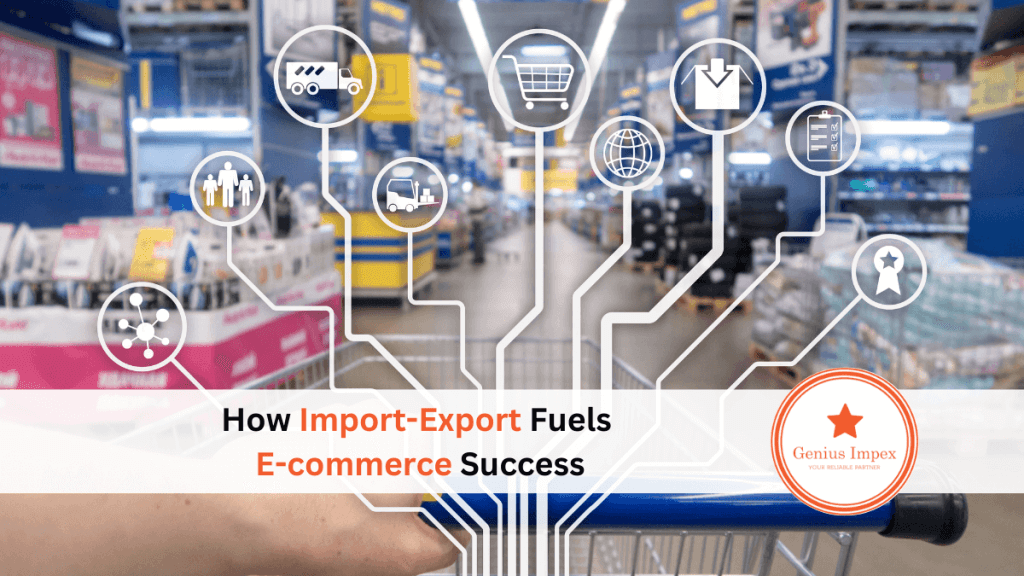The digital age has ushered in an unprecedented era of global connectivity, and nowhere is this more evident than in e-commerce. As consumers increasingly turn to online platforms for shopping, the e-commerce landscape has evolved into a dynamic global marketplace. At the heart of this revolution lies the key role of import-export, the engine driving success for online retailers worldwide.
The Global Marketplace for E-commerce
E-commerce, once confined to local markets, has transcended geographical boundaries. Today, an online business based in New York can seamlessly connect with customers in Tokyo, London, or Sydney. This expansion brings with it a myriad of opportunities and challenges. On the one hand, businesses gain access to a vast and diverse customer base. On the other, they must navigate the complexities of international trade regulations, shipping logistics, and currency exchanges.
According to recent statistics, the international nature of online retail is unmistakable. Cross-border e-commerce sales are projected to reach trillions of dollars in the coming years, underscoring the significance of the global marketplace in shaping the future of retail.
The Dynamics of Import-Export in E-commerce
Understanding import-export dynamics in this context is essential to comprehend the e-commerce revolution fully. Import-export, in simple terms, refers to the exchange of goods and services across borders. E-commerce involves sourcing products from different countries, adding a layer of complexity to the traditional supply chain.
Successful online retailers have harnessed the power of import-export to diversify their product offerings and stay competitive in an ever-expanding market. By integrating international suppliers and manufacturers into their supply chains, these businesses ensure a steady stream of unique and high-quality products, setting them apart from their competitors.
Benefits of Import-Export for E-commerce Business
Here are some key advantages:
Diversification of Product Offerings:
- Online retailers can diversify their product offerings by sourcing goods from different countries and regions.
- Access to a global marketplace allows businesses to cater to a broader range of consumer preferences and cultural tastes.
- Diversification minimizes the risk of relying heavily on local market trends and enhances the appeal of the product catalog.
Cost-Effective Sourcing and Manufacturing:
- Import-export enables online retailers to source materials and products from countries with competitive advantages in production.
- Access to cost-effective labor and resources can result in more economical manufacturing processes.
- Lower production costs improve profit margins and pricing flexibility, allowing businesses to stay competitive.
Access to a Broader Customer Base:
- International trade expands the potential customer base for online retailers beyond their domestic markets.
- Targeting consumers in different regions and countries introduces the brand to a more extensive and diverse audience.
- The ability to offer unique or niche products unavailable locally can attract a global customer base seeking distinct offerings.
Competitive Advantage through Unique and Exotic Products:
- Importing unique or exotic products not commonly found in local markets provides a competitive edge.
- Online retailers can differentiate themselves by offering products that stand out in quality, design, or cultural significance.
- The exclusivity of imported goods can contribute to brand loyalty and customer retention.
Economies of Scale and Bulk Purchasing:
- Engaging in import-export allows online retailers to benefit from economies of scale by purchasing goods in larger quantities.
- Bulk purchasing often leads to discounted prices and lower per-unit costs, improving overall profitability.
- The ability to negotiate favorable terms with international suppliers enhances the financial efficiency of the supply chain.
Seasonal and Trend Adaptability:
- Import-export facilitates the adaptation to seasonal trends and consumer preferences across different regions.
- Online retailers can capitalize on the availability of seasonal products or adjust their inventory to meet the demands of various markets.
- The flexibility to pivot quickly in response to changing trends enhances the agility of the business.
Risk Mitigation through Geographic Diversification:
- Diversifying the sourcing of products across different countries helps mitigate geopolitical, economic, or environmental risks.
- If disruptions occur in one region, businesses can rely on suppliers from other areas to maintain a consistent supply chain.
- Geographic diversification enhances resilience and minimizes the impact of unforeseen events on business operations.
Enhanced Innovation and Quality:
- Exposure to diverse international markets encourages innovation and the adoption of new ideas.
- Collaboration with suppliers and manufacturers from different regions can lead to the developing of high-quality and innovative products.
- The constant pursuit of excellence to meet global standards contributes to continuous product quality improvement.
Challenges and Solutions in Import Export Business
However, the road to success in international e-commerce has its challenges. Regulatory hurdles, compliance issues, and navigating the intricacies of different legal systems can pose significant obstacles. Logistics and shipping challenges, such as varying shipping times and customs procedures, add complexity to the supply chain.
Moreover, currency exchange and financial risks can impact the profitability of cross-border transactions. Fluctuating exchange rates and transaction fees can erode profit margins, making it crucial for online retailers to implement effective risk management strategies.
Businesses must adopt a proactive approach to overcome these challenges. Staying abreast of regulatory changes, investing in robust logistics solutions, and employing financial strategies to hedge against currency risks are essential components of a successful import-export strategy.
Technology and Innovation in Import-Export
Here are key aspects of technology and innovation in import-export:
E-commerce Platforms and Tools:
Modern e-commerce platforms are equipped with sophisticated tools designed to facilitate import-export transactions. Features such as automated order processing, real-time inventory tracking, and integrated shipping solutions contribute to smoother cross-border operations. These platforms provide a centralized hub for managing international transactions, reducing the complexity traditionally associated with import-export.
Blockchain Technology:
Blockchain technology has emerged as a transformative force in import-export, offering enhanced security, transparency, and traceability. Through blockchain, each transaction is recorded in an immutable and decentralized ledger, minimizing the risk of fraud and ensuring the integrity of the supply chain. Smart contracts, powered by blockchain, automate and enforce contractual agreements, reducing the need for intermediaries and streamlining processes.
Customs Compliance and Documentation:
Technology has significantly improved customs compliance and documentation processes, crucial aspects of international trade. Automated customs clearance systems help businesses navigate complex regulatory requirements, reducing the risk of delays and compliance-related issues. Electronic documentation systems enable the seamless exchange of information between parties, accelerating the flow of goods across borders.
Real-time Tracking and Visibility:
Advanced tracking systems provide real-time visibility into the movement of goods throughout the supply chain. GPS technology, RFID tags, and IoT devices allow businesses to monitor the location, condition, and status of shipments in transit. Enhanced visibility contributes to better inventory management, more accurate delivery estimates, and proactive issue resolution.
Data Analytics and Predictive Insights:
Data analytics tools offer valuable insights into market trends, consumer behavior, and supply chain performance. Predictive analytics help businesses anticipate demand fluctuations, optimize inventory levels, and make informed decisions regarding procurement and production. By harnessing big data, businesses can enhance their strategic planning and gain a competitive edge in the global marketplace.
Machine Learning and Artificial Intelligence (AI):
Machine learning and AI applications are increasingly being integrated into import-export processes. AI algorithms optimize routing and shipping decisions, considering cost, time, and environmental impact. Natural language processing (NLP) facilitates better communication between international parties, overcoming language barriers and ensuring negotiation clarity.
Digital Payments and Finance Solutions:
Digital payment platforms and fintech solutions have simplified financial transactions in international trade. Cryptocurrencies and blockchain-based payment systems offer secure and transparent alternatives to traditional banking methods. Digital finance tools enable businesses to manage currency exchange, mitigate financial risks, and conduct transactions more efficiently.
Augmented Reality (AR) and Virtual Reality (VR):
AR and VR technologies are finding applications in product visualization, inspections, and quality control in import-export. Virtual inspections allow parties to assess the condition of goods remotely, reducing the need for physical presence and expediting decision-making processes. AR enhances the customer experience by enabling virtual try-ons or visualizing products in real-world settings before purchase.
The Future of E-commerce and Import-Export
The convergence of e-commerce and social commerce is another trend to watch. Social media platforms are evolving into robust marketplaces, providing a seamless shopping experience for consumers. Integrating import-export strategies into these platforms can further enhance the global reach of businesses.
Final Words
The e-commerce revolution powered by import-export reshapes how we shop and do business. The global marketplace’s interconnectedness offers unparalleled growth opportunities, but success requires a strategic and adaptive approach.
By understanding the dynamics, leveraging technology, and learning from both successes and failures, online retailers can navigate the complexities of international trade and thrive in the ever-evolving world of e-commerce. The future belongs to those who embrace the transformative power of import-export in shaping the next chapter of retail history.
“Ready to turn your digital dreams into reality? Reach out to us for top-notch web design and development services. Whether it’s crafting dynamic e-commerce platforms, captivating business websites, or any other website, we’ve got you covered. Let’s build your digital success story together!“
Subscribe To Our Newsletter
Join our mailing list to receive the different procedures, information, ideas, and updates from our team about the import export business.

